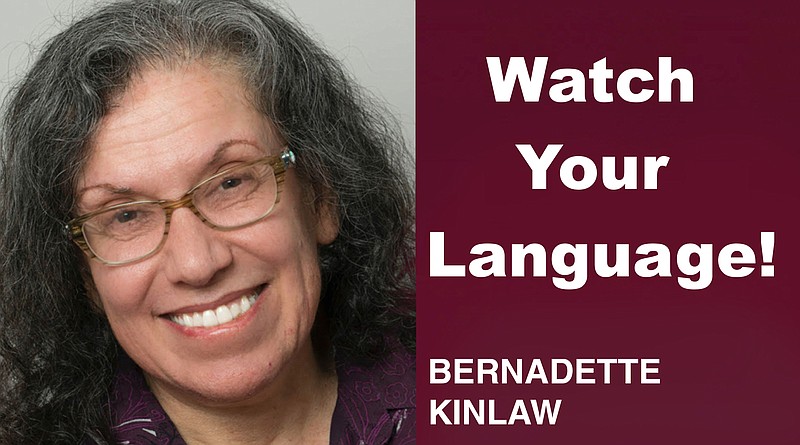I believe this is the last time in 2020 I'll highlight the Word of the Year, but I can make no promises.
The Oxford Expanded Dictionary took a vastly different route this year from choosing just one word. Instead, the editors concluded that this was "a year which cannot be neatly accommodated in one single word."
A news article in The Guardian said the dictionary editors found "there were too many words to sum up the events of 2020. Tracking its vast corpus of more than 11 billion words found in web-based news, blogs and other text sources, its lexicographers revealed what the dictionary described as 'seismic shifts in language data and precipitous frequency rises in new coinage' over the past 12 months."
So, rather than deciding on one word, the editors wrote a 38-page report that you can download.
I won't mention every word detailed in the report because doing so could take me into 2021.
The report includes a timeline of when words were most frequently searched for, as well as other language trivia.
In January, bushfire was popular because of the widespread fires in Australia. And impeachment look-ups coincided with the charges against President Trump and the ensuing trial.
March blew in with coronavirus. This is when, Oxford reported, coronavirus became one of the most often used nouns in English.
In July, many people sought the definition for BIPOC, which stands for "Black, Indigenous and people of color."
In August, after Belarus' President Alexander Lukashenko was re-elected, protests erupted from people who didn't believe the election results. The number of people who looked up the adjective Belarusian soared, showing that we often learn things during world disruptions.
August also brought mail-in into more common usage. People reported slowdowns in the mail, at the same time that people were nervous about voting in person in the presidential election. People started advocating the use of mail-in voting, and they urged that people send the mailing in early. People looked up the term 3000% this year over last year.
In September, the British coined a cool name for their push for massive covid testing. They called it moonshot. That's one small step for nasal swab ...
October highlighted net-zero. That's defined as "the balance between the amount of greenhouse gas produced and the amount removed from the atmosphere. We reach net-zero when the amount we add is no more than the amount taken away."
The editors said this increase in look-ups happened after China's President Xi Jinping's pledge for his country to be carbon neutral by 2060.
Another item of interest in the report: In the U.S., we use the term essential worker to describe those people whose jobs are so needed that they work even amid lockdowns. (In Britain, the term is more often key workers.) So, in 2020, the "most statistically significant noun" modified by essential in 2020 was worker. In 2019, the term was oil. Essential oils, Merriam-Webster says, are "any of a class of volatile oils that give plants their characteristic odors and are used especially in perfumes and flavorings, and for aromatherapy."
That's another sign of how vastly different 2019 and 2020 were.
Oxford mentioned a phrase that can be taken two ways: mask-shaming. Articles in The Guardian show the two meanings.
Early in the pandemic, an official in North Dakota asked people for kindness. The Guardian says that as Gov. Doug Burgum tried to hold back tears, he said:
"So again, I would just love to see our state, as part of being 'North Dakota smart,' also be 'North Dakota kind,' 'North Dakota empathetic,' 'North Dakota understanding,' to do this thing. Because if somebody wants to wear a mask, there should be no mask-shaming."
Another article used the same term for criticizing people who don't wear masks: "'Mask meltdown' videos have become a feature of the pandemic, part of a larger trend of mask-shaming. Sneering at people who refuse to wear face coverings has become a particularly viral form of virtue signaling."
The fact that mask-shaming has two opposite meanings makes it a contranym.
THE JOLLY ASSOCIATED PRESS
The Associated Press released its holiday guidelines recently.
I guess holly, jolly celebrations often include excessive drinking, because the word hangover is included in the guide. I guess that's so people will know whether it's one word or two when they're texting their friends the next day about what the stabbing morning light has brought.
Someone asked me ages ago what the past tense of the verb to light was. The guide says that both lighted and lit are acceptable for the past tense.
Apparently, Santa's nickname is Kriss Kringle. I think I thought his first name was Kris.
That hard-to-spell Christmas plant is poinsettia. As a kid, I was certain it was pronounced point-SETta, and I had no idea how to spell it.
And the holidays are when people misuse apostrophes when they address their greeting cards. A man's last name is Bennett. As a whole, his family members are the Bennetts. Never, ever call them "the Bennett's."
Sources include Oxford Expanded Dictionary, The Guardian, Merriam-Webster, The Associated Press Stylebook. Reach Bernadette at
bkwordmonger@gmail.com
